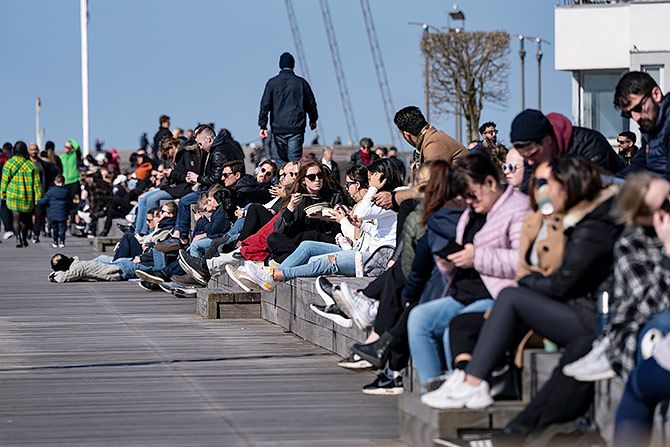'The Swedish government would consider who will live, who will not die, in rationing coronavirus healthcare!'
'This means the 'biological age' would supersede the patient's chronological age as a potential guideline,' notes Ambassador M K Bhadrakumar.

It might have sounded exciting two days ago to propose the Swedish pathway as the ideal route for India to pursue (external link) to combat the coronavirus. But no longer so.
When it comes to COVID-19, a cut-and-paste policy from Sweden, which has a very different cultural and historical background, and mindlessly extrapolating it can be risky for India's conditions.
To be sure, the evolving pandemic and economic shock has to be met with in an Indian way.
And India's business and industry is clamouring for resumption of activity.
Yet, the Exit Plan from Lockdown (external link) emerging out of the four-hour interaction between Prime Minister Narendra Damodardas Modi and the state chief ministers on Saturday, April 11, has all the Indian characteristics and rests on consensus opinion.
The Swedish pathway runs like this: One, social distancing measures are not the be-all-and-end-all of the combat against coronavirus.
Two, although some restrictions were in place in Sweden and many people on their own accord observed general safety and social distancing measures, the authorities felt it was better to have much of the country operating somewhat normally instead of shutting it all down.
Three, lockdown? The Swedish government rejected the idea.
But the core of the Swedish strategy lay in the 'herd immunity' approach -- that is, the thinking that it would be good for the population to gain immunity to the disease, though it is not the stated official policy that Swedes should purposely seek 'herd immunity'.
Today, Sweden finds itself in very big trouble.
As of April 9, Sweden's rate per capita of confirmed deaths from coronavirus is higher than the rate of its fellow Scandinavian countries -- or the US.
Hospitals are overcrowded and staff members are overworked, and the military has begun setting up field hospitals in major cities, including Stockholm.

The Swedish government is now seeking extraordinary powers (external link) to impose further restrictions, as the number of deaths steadily approaches 1,000 (external link).
The move will pave the way for new laws that could lead to nationwide lockdown.
Sweden's social democratic political culture is swinging to the other extreme.
The proposed legislation would empower the government to act even without consulting parliament.
The paradox is that when a notion prevails that lockdown harms the business and economy, even without a lockdown, the Swedish economy is already seeing significant effects from the coronavirus outbreak.
Lay-offs of workers are taking place at a level dwarfing that of the 2008 financial crisis and the economic crisis of the 1990s.
According to the National Institute of Economic Research, the Swedish agency that reports to the finance ministry, its baseline scenario has real GDP growth declining by 3.4 percent this year (worse than the 2.9 percent forecast for the US).
Clearly, there is extreme uncertainty about future developments and despite the government's light-touch approach, severe economic hardship is on cards.

Having said that, the really bizarre part of the 'herd immunity' strategy is that coronavirus patients over 80 and those over 60 with multiple organ failure will not be given priority for intensive care.
In sum, the Swedish authorities were looking to prioritise certain groups of people for intensive care who are more likely to survive severe cases of the virus if or when hospital capacities are overwhelmed.
That is to say, any patient in those categories that experience organ failure while in an ICU could also be taken out of intensive care, as well.
The ethical dimension (external link) is frightening.
The government would consider who will live, who will not die, in rationing coronavirus healthcare! This means the 'biological age' would supersede the patient's chronological age as a potential guideline.
Sadly, the situation in Sweden is expected to get much worse in the coming weeks.
Sweden has recorded more than 10,000 cases and 887 deaths.
The relaxed social distancing policies, which allowed restaurants and bars to remain open and public gatherings to continue, are now being reconsidered.
Prime Minister Stefan Lofven has conceded that the approach so far was not good enough.
For a start, the authorities waited too long and did too little to address the outbreak of the virus. (Sounds familiar?)
Lofven is also facing severe criticism over Sweden's lack of preparedness for a crisis of this nature, including its lack of emergency drug stockpiles and ICU beds. (Sounds familiar, too?)
The 'herd immunity' thesis basically stems from the idea that resistance to a disease comes when enough people in the general population have survived it.
It is no longer important to know exactly how many people are infected!
Sweden's motivation appears to have been to sequester the healthcare system from overload and to keep the economy functioning while slowing the rate at which people get sick.

Now, it is entirely conceivable that 'herd community' is the one thing that would eventually slow down the spread of coronavirus.
Most epidemiologists seem to agree here.
The choice seems to narrow down to one of the two: Attain 'herd immunity' by people getting infected in large numbers and getting well again; or, reach immunity by vaccinating people.
The renowned German disease control expert Professor Lothar Wieler, who heads the Robert Kock Institut in Berlin, the country's leading research centre on epidemiology and coronavirus, said recently that pandemics tend to run their course in waves, and factors influencing how COVID-19 unfolds include how many people become immune to it after contracting the virus - and how quickly a vaccine is made.
Dr Wieler warned that the coronavirus pandemic could continue for two years, depending on how long it takes for an effective vaccine to be developed and if people develop immunity after illness.
But the key issue here is the fear of the unknown.
We don't have any data on 'herd immunity' yet.
There is no empirical evidence to support taking such an untrodden path during a pandemic.
Meanwhile, the death rate from coronavirus in Sweden is currently accelerating faster than its neighbouring countries. Sweden's strategy backfired (external link).
Ambassador M K Bhadrakumar served the Indian Foreign Service for more than 29 years. He has served as India's ambassador to Turkey and Uzbekistan and has been a contributor to Rediff.com for well over a decade.










